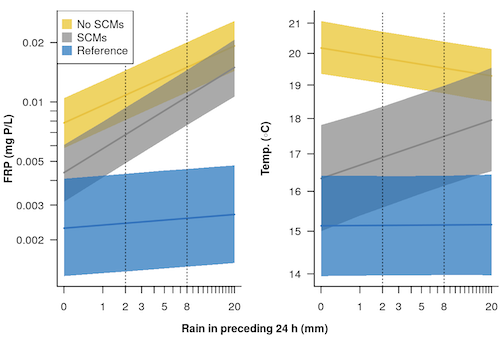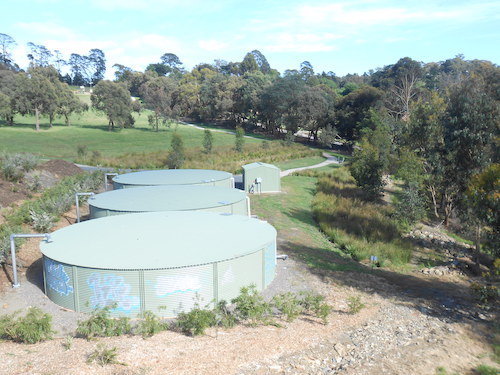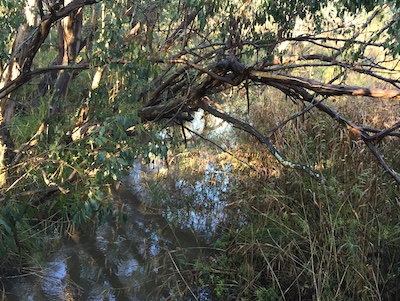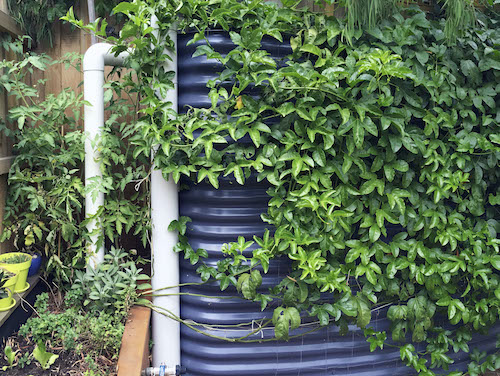Featured paper
 Walsh, C. J., Imberger, M. J., Burns, M. J., Fletcher, T. D., & Bos, D. G. (2022). Dispersed urban-stormwater control improved stream water quality in a catchment-scale experiment. Water Resources Research, e2022WR032041.
Walsh, C. J., Imberger, M. J., Burns, M. J., Fletcher, T. D., & Bos, D. G. (2022). Dispersed urban-stormwater control improved stream water quality in a catchment-scale experiment. Water Resources Research, e2022WR032041.An outcome of the Little Stringybark Creek experiment, which aimed to test if creeks downstream of stormwater drainage can be restored. 100s of rain-gardens that allow to water soak into surrounding soils and be taken up by plants, and rainwater tanks for harvesting, were installed in two suburban catchments. Comparing water quality before and after installation, in experimental streams, and in urban control and reference forested streams, we showed that filtering and harvesting stormwater reduced summer temperatures and reduced concentrations of phosphorus and nitrogen, critical contaminants for healthy streams. The reductions were greatest in dry weather, and after small amounts of rain. To achieve water quality similar to forested streams, we need rain-gardens and harvesting systems that catch runoff from nearly every roof and road upstream. Achieving that will require reserving space near pipe outlets to streams for final treatment systems, and finding ways to use the excess water generated by roofs and roads. DOI: 10.1029/2022WR032041
Recent posts
City of Yarra Sustainability awards
If you think my raingarden diary is a useful resource, please consider voting for my entry in the City of Yarra Sustainability Awards peoples’ choice vote. They have listed it as an entry from Melbourne University, but I entered as a private resident of the City of Yarra (it is listed…
My raingarden diary in print
My raingarden diary features in the latest issue of ReNew Magazine. Ironically, this issue (No. 135) is subtitled ‘The Water Saving Special”, while the biggest challenge for our system is to use enough of the large volume of water that our house produces. Even with the gardens growing amazingly over…
A sad, avoidable, predictable day
Of course they are running the line that the 50 gigalitres that the government have ordered from our desalination plant next summer is drawing on our insurance policy (that is costing us something like $600 million dollars a year before they turn it on, and substantially more for the water delivered, while…
Reliability Schmeliability
One of the most common arguments I hear from a subset of urban water managers who don’t like rainwater tanks is that tanks are too unreliable to be considered a viable urban water source. So, perhaps now, a week after our tank lay empty for 8 days, would be a good…
This site is maintained by Chris Walsh,
Principal Research Fellow in the Waterway Ecosystem Research Group,
School of Ecosystem and Forest Sciences at The University of Melbourne.
He lives in Richmond, where he obsesses about his
house's stormwater runoff.
His research contributes to the Melbourne Waterway Research-Practice Partnership.
Other resources for Chris's research include:
Google Scholar,
The Open Science Framework,
GitHub,
The University of Melbourne's 'Find and Expert' page.
Contact details.
Waterway Ecosystem Research Group,
School of Ecosystem and Forest Sciences
The University of Melbourne Burnley Campus
Building 903, 500 Yarra Boulevard
Burnley Victoria 3121, Australia
Tel: +613 8344 9155
Fax: +613 9349 4218
e-mail: cwalsh@unimelb.edu.au
For directions to the WERG,
click on the pointer in this version of the map.
Privacy policy










